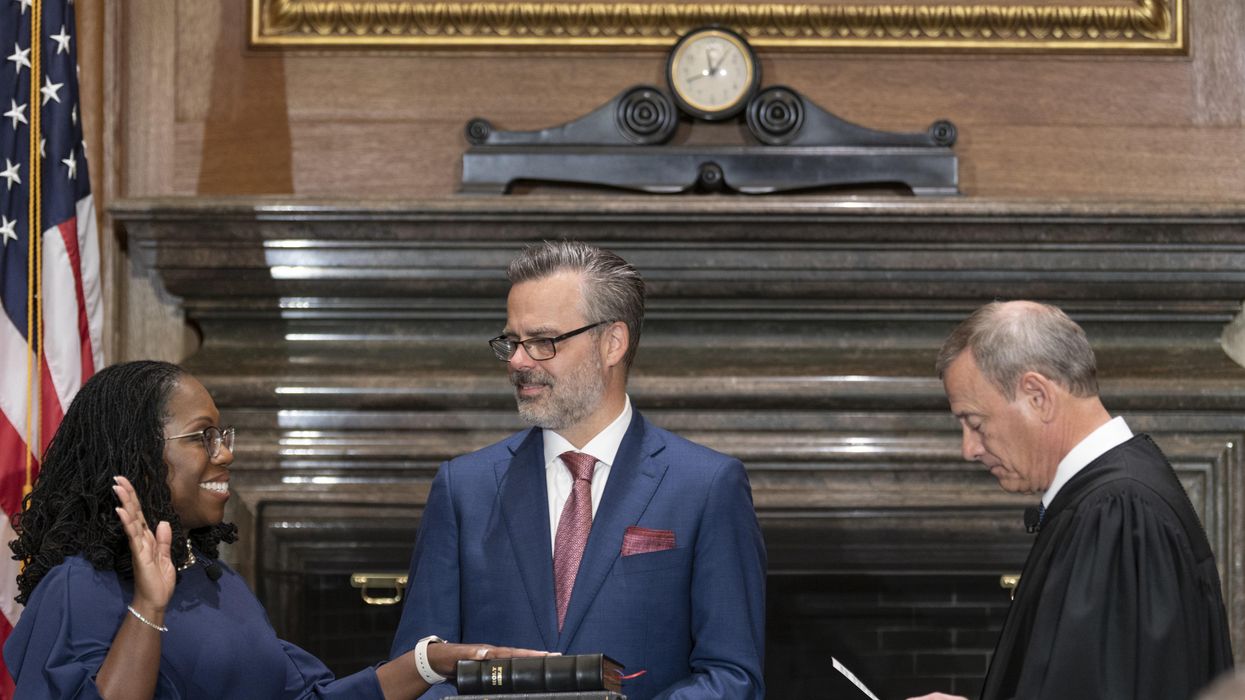Originally published by The 19th.
Justice Ketanji Brown Jackson was sworn in on Thursday as the 104th associate justice of the U.S. Supreme Court. She is taking her place as the first Black woman on the court at a complex time, when questions are being raised about its legitimacy and the role of politics in its decision making.
Legal experts celebrated Jackson’s ascent to the high court, but told The 19th they have mixed feelings about what this moment means for the country.
“Being a Black woman in America is about often having to hold two conflicting thoughts at the same time. So, on one hand, I feel this joy that she is breaking this huge barrier that has been in place for centuries,” said Kimberly Mutcherson, co-dean and professor at Rutgers Law School in Camden, New Jersey. “Then the other thought is how easily this country takes away from us. It gives and it takes almost an equal measure.”
Jackson’s appointment fulfilled a promise PresidentBiden made on the campaign trail in 2020, when he said he would nominate a Black woman to the nation’s highest court. She brought an accomplished résumé with experiences underrepresented on the court: She was confirmed in 2021 to Washington, D.C.’s prestigious federal court of appeals, had nearly a decade of experience as a federal judge, worked on the U.S. sentencing commission and had served as a federal public defender.
Jackson is replacing Justice Stephen Breyer, whose retirement became official on Thursday and who was one of the three liberal justices who voted against overturning Roe v. Wade, the landmark 1973 decision establishing a federal right to abortion. With Jackson’s addition, that liberal wing is now a multiracial group of three women. Their ability to influence decisions may be limited, but in their judicial dissents they can help create a blueprint for future rulings, said Gretchen Borchelt, vice president for reproductive rights and health at the National Women’s Law Center.
“Taking the long view knowing that someday these searing dissents from [Sonia] Sotomayor, [Elena] Kagan, and hopefully now Justice Ketanji Brown Jackson, will be the majority opinion. That gives me hope and optimism,” Borchelt said.
Biden nominated Jackson in February, and three days of Senate confirmation hearings were held less than a month later, highlighting stark political divisions surrounding the court. At one point Republican Sen. Ted Cruz of Texas asked whether she believes babies are racist. Multiple Republican senators accused her, without evidence, of protecting child abusers. She was confirmed April 7 by a vote of 53-47.
Now, Jackson will take her seat on the court just days after it overturned roe. Friday’s ruling in Dobbs vs. Jackson Women’s Health Organization ignited concern about other privacy-based rights, including same-sex marriage equality and access to contraception.
The ruling also raised another question about the court itself: A draft of the Dobbs opinion was published by Politico in May, sparking an internal investigation into how the decision was leaked. Leaks from the court have been rare, and no full draft opinion has become public in this manner in modern times.
The abortion ruling — and leak — come after years punctuated by political fights over the court. At the end of President Barack Obama’s administration, Republican senators blocked the Supreme Court nomination of Merrick Garland, saying it was too close to the 2016 presidential election.
That led to President Donald Trump successfully appointing his first justice, Neil Gorsuch. A fight also ensued around Trump’s second Supreme Court nominee, Brett Kavanaugh, who faced allegations of sexual assault and misconduct. Following the conflict surrounding Garland’s nomination during an election year, Justice Amy Coney Barrett’s nomination by Trump in September 2020, less than two months before the presidential election, upset many Democrats.
More recently Justice Clarence Thomas, who became the second Black Supreme Court justice after his nomination by Republican President George W. Bush in 1991, has faced questions about his objectivity in voting on issues around the election. His wife, Ginni Thomas, reportedly pressed state lawmakers and a Trump White House official to find ways to overturn Trump’s 2020 election defeat to Biden.
Through the years, public sentiment about the court has eroded. Just 25 percent of Americans said this month that they have confidence in the Supreme Court, according to a Gallup poll. In 2012, that number was 37 percent; in 2002 it was 50 percent.
The Dobbs decision reflects how “the court is reminding us how little we matter,” Mutcherson said. “And by ‘we’ I mean all of the folks who were left out of the Constitution when it was originally written, and who have slowly been incorporated into that document.”
More on the Supreme Court from The 19th
- From marriage equality to interracial marriage, Supreme Court conservatives appear divided on handling civil rights after Roe decision
- Liberal justices’ dissent sketches out ‘the loss of power, control, and dignity’ in a post-Roe America
- Roe v. Wade has been overturned. In these states, abortion access will no longer be accessible.
Glynda Carr, the president of Higher Heights for America PAC, which supports progressive Black women running for office, cautioned that Jackson’s presence alone cannot save the rights many see being in jeopardy.
“One Black woman is not going to save the world or democracy,” Carr said. Jackson will bring her qualifications and lived experiences, Carr continued, but cannot carry the court on her own.
Looking forward, Carr said the public’s heightened interest in the court and justice’s political ties could bring about a new wave of action and scrutiny.
“I think Americans are uniquely in tune to the power of this court,” Carr said. “I think the advocacy that everyday Americans will have around the court in this moment will forever change.”




















Trump & Hegseth gave Mark Kelly a huge 2028 gift